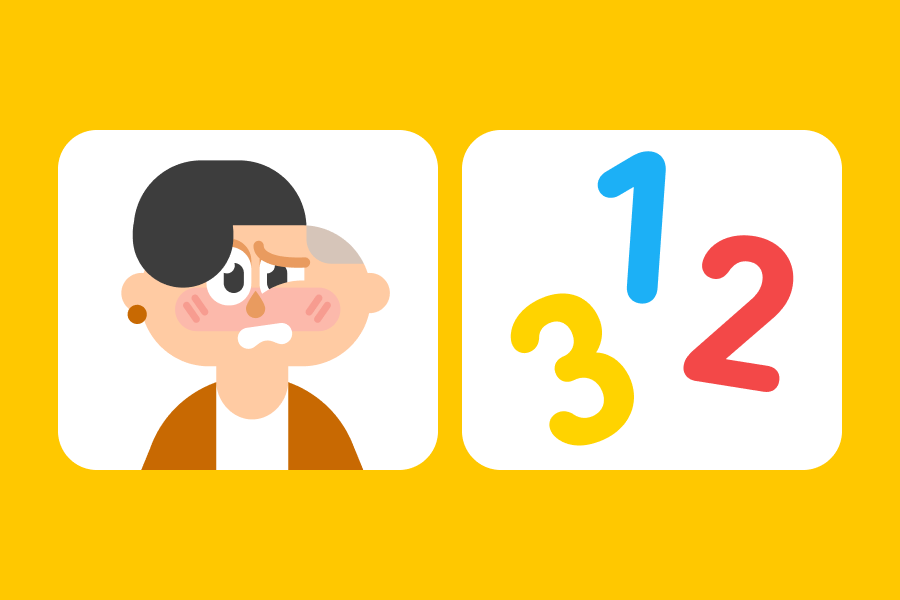From calculating a tip to determining how much the grocery bill will be, numbers can be intimidating. If you have anxiety about doing math, you might try to avoid it completely... but you can't subtract math from your life forever! Here’s what’s causing math anxiety—and how to stop sweating the subject.
Math anxiety: It’s more than a feeling
Math anxiety can occur in children as young as 6 years old and can show up throughout the lifetime. In fact, in a recent survey, 93% of US adults reported having at least some math anxiety. That anxiety is more than just nerves—research shows that it can make it more difficult to do math in your head!
When someone has high math anxiety, their brains have to work harder and use more resources. That's because doing math involves working memory—the system that allows our brains to think about several things at the same time. When we're anxious about math, our memory resources are being used up by the negative emotions around math, leaving less working memory to actually solve the math problem! Research also shows that people with higher working memory perform better on math tests than people with lower working memory.

What causes math anxiety?
Math anxiety can stem from a few sources: biology, ideas about identity, and ideas about effort.
When it comes to biology, all brains are not alike! Working memory resources vary from person to person, so some people have more and others have less. Some brains react more to perceived threats than others, too—you might be more likely to cross the road than your friend when you see a snake! So there can be big differences between people when they see numbers and feel stress. It’s okay to be a little nervous when there are snakes out there, but having too much anxiety around numbers can make it difficult to do well in school and work (or to calculate that tip!).
In addition to the brains we have, how we see ourselves—our identity—matters. Stereotypes about how well people with different identities can do math can have real impacts on levels of anxiety. For example, if women are in a situation where they are made to think about their identity as a woman, they can feel more anxious that their math performance will reflect poorly not just on them but on all women! Feeling that way increases anxiety, even if the women are very accomplished in mathematics.
Math anxiety can also be rooted in ideas about effort—that there's little you can do to move beyond your natural abilities. For example, you may have heard someone say that they’re not a "math person." This fixed mindset (that people are born with skills that can't be changed) is associated with higher levels of math anxiety and avoiding math. But people actually have a lot of flexibility, even when it comes to their natural skills! For example, how we talk about math can change the fixed mindset attitude, especially when it comes from teachers and parents. Students are more likely to have lower math anxiety and put in more effort when teachers give praise about how students did and how they can improve, rather than personal praise about inherent abilities (like "You’re really smart!"). In fact, this growth mindset—having the attitude that you can improve by focusing your efforts—is associated with more success in math!
How to reduce math anxiety
Don't be scared—Duolingo’s got your back! Here are some research-proven strategies that can decrease your anxiety:
Just breathe. The more you stress, the less you breathe, and the less you breathe, the more you get into a stress spiral. Researchers have found that deep breathing techniques, along with meditation, can help anxious learners remain calm enough to succeed on math exams.
Write about it. Journaling about your math concerns before doing math has been shown to decrease anxiety, allowing you to do your best! So take a breath, pick up the pencil, and let your worries go by doing some reflective writing!
Practice and then practice again. Much of the emotional spikes people feel when thinking about math is because they don't have enough good experiences with math, so they focus on the bad ones and end up not doing math that often. Research shows that you can reduce math anxiety by practicing basic math in low-stakes ways. Using Duolingo Math would be a great way to fit in fun math practice every day!
Divide and conquer your math anxiety!
Math anxiety runs rampant through our society, making us sweat at the sight of numbers and avoid thinking about math altogether. But it doesn’t have to be that way! By understanding the roots of math anxiety and research-based solutions to decrease it, you can learn to face down numbers, double recipes, and convert currencies with confidence!
